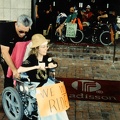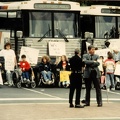The Voice
OF THE PHYSICALLY CHALLENGED
WELLESLEY, MASSACHUSETTS 02181
JUNE 1989 - VOL. 2, NO. 9
[Headline] TRANSIT ACCESS FIGHT COMBINES COURT ACTIONS, STREET PROTESTS
Photo: Dressed in revolutionary war costumes, three cornered hats,and colonial wigs, five ADAPT members (a man standing playing a flute, Joe Carle, Diane Coleman, Bob Kafka and Mark Johnson) lead a long line of marchers in wheelchairs and standing. They are gathered on a sidewalk under some trees and with Independence Hall and other historic buildings
behind them.
Caption reads: COLONIAL GARB drew attention to ADAPT and CORD members circling around Independence Park in Philadelphia on May 14.
Photo: A row of about a dozen people in wheelchairs holding signs blocks a street with 3 buses on it. Two are further back and have more protesters with signs blocking them. Signs read We Will Ride, Access Now, Disabled in Action, Access Not Excuses and similar messages.
Caption reads: MASSACHUSETTS representatives of ADAPT and CORD during the "crawl on" in Philadelphia on May 13.
By BILL HENNING
The battle to secure full access to public transportation for people with disabilities has been fought during this first half of 1989 in two arenas--in the courts and in the streets.
On February 13, the U.S. Court of Appeals in Philadelphia ruled that all transit systems receiving federal financial assistance can only purchase accessible buses. And they said that paratransit service must be maintained as needed.
"This landmark decision, the product of a lawsuit led by American Disabled for Accessible Public Transportation (ADAPT) and the Eastern Paralyzed Veterans of America (PVA), struck down fabricated transit regulations implemented by the Department of Transportation in 1986," said Mike Early, an organizer with the Cape Organization tor Rights of the Disabled (CORD). "Gone were the ‘local option‘ and '3% cost cap'
rules, which allowed transit systems to severely limit the amount of accessible services they provide."
"Unfortunately, the Bush administration successfully asked for the case to be reheard, wiping out the original ruling."
Wide support for the February court decision surfaced on Good Friday, March 24, when activists in 13 cities demonstrated for equal transportation access. CORD and the Massachusetts Office of Handicapped Affairs (OHA) organized a rally in Cambridge that attracted over 100 people, the largest of the nationwide events.
"The concept of equality for disabled people must scare the government," said CORD advocate Kent Killam. "President Bush has spoken in favor of disability rights since he took office, saying all the right things, but his administration's actions speak otherwise."
“They are arguing against equal access to transit in asking for a rehearing of the Philly case -- they even say that Section 504 of the 1973 Rehabilitation Act does not guarantee equal rights. They are trying to move us backwards!"
Many advocates also hailed the initial ruling in the ADAPT and PVA lawsuit because it advanced the concept that "separate is not equal“ for disabled people, much as had been stated in the historical Brown vs. Topeka civil rights case in 1954.
"The way was paved for all practices and policies that isolate and segregate 'disabled' people to be struck down," Jim Glelch, director of OHA, commented.
In a recent series of protests, members of ADAPT, as has been their history, dramatized their demands for equal transportation access. In April, they disrupted meetings oi the American Public Transit Association (APTA) in Reno; 49 ADAPT members were arrested-with a number staging a five-day hunger strike in jail. APTA is a regular ADAPT target because their lawsuit in 1979 stopped implementation of regulations for 100% accessible transit systems proposed by the Carter administration.
Two weeks later on April 24, similar numbers of ADAPT members were arrested after breaking up a meeting of the federal Urban Mass Transit Authority (UMTA) in Denver. And the next day over 40 people were carried out oi the offices of the U.S. Attorney's office after he refused to call U.S. Attorney General Thornburgh to register the group's demand for accessible buses.
Finally, from May 12 to May 15, ADAPT members, with an assist from nine persona from Massachusetts, including members of CORD, Cape United Elderly, and the Disabled Peoples Liberation Front staged four events to illustrate the need for access.
Actions began with a meeting with the U.S. Attorney for Philadelphia, who called Attorney General Thornburgh and expressed the group's demand tor equal access to public transportation.
The following day, May 13, a “crawl on" was held in front of the federal building where the ADAPT lawsuit was to be reheard. People left their wheelchairs and attempted to get on buses without lifts. The consequence: three buses were stopped, a major downtown traffic jam developed, and important media coverage showing how buses without lifts do not serve many disabled people was obtained.
On Sunday, 50 people, many attired in Revolutionary War costumes, marched around Independence Park to dramatize the quest for the freedom that can stem from accessible transit systems. Participants included Justin Dart, former Rehabilitation Services Administration director. An hour-long takeover of the Liberty Bell pavilion highlighted the day. In the evening, 29 people camped all night in front of the court building in a vigil for access. In the morning, the group attended the opening arguments of the rehearing of ADAPT vs. the Department of Transportation.
"I felt like a true patriot the whole weekend in Philadelphia," commented CORD member Leo Lucas. "The chant, ‘What do we want? Access! When do we want it? NOW!' is stuck in my mind."
"The series of events was fantastic," said Mike Newhall of CORD. "Fighting for our rights is moving, spiritual, a true group effort that touched a lot of people."
"We will ride!", exclaimed Mike Early.
According to John Chappell of the Massachusetts Rehabilitation Commission. more protest occurred in Washington on May 15. Over 300 people who attended the annual conference of the National Council on Independent Living marched from the Capitol Hill area to the White House to show their concern over the President's failure to fully endorse the Americans with Disabilities Act. This bill, among many other things, would guarantee 100% accessible transportation if passed in its current form.
"We have to continue to act publicly and aggressively." said Jim Gleich. "No one will give us our rights -- we have to demand them. We have to speak out for them.“
- Created on
- Friday 12 July 2013
- Posted on
- Thursday 1 October 2015
- Visits
- 812
- Rating score
- no rate
- Rate this photo


0 comments